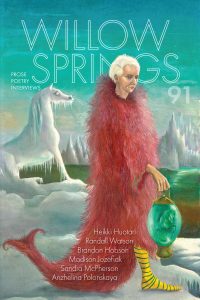
About Randall Watson
Randall Watson is the author of No Evil is Wide, (Madville Publishing), which received the Quarterly West prize in the novella, The Geometry of Wishes (Texas Review Press), a finalist in the Juniper and Tampa Review Poetry Prizes, The Sleep Accusations, which received the Blue Lynx Poetry Prize at Eastern Washington University, (currently available through Carnegie Mellon University Press), and Las Delaciones del Sueno, translated by Antonio Saborit with an Introduction by Adam Zagajewski, published in a bi-lingual edition by the Universidad Veracruzana in Xalapa, Mexico.
To find out more, check out his website.
A Profile of the Author
Notes on Three Poems
So. I ask myself, where is it poems emerge from, what locus of influences, what subterranean roots, like an Aspen grove, the hidden, often obscure indefinable interactions out of which a form emerges, the rhythm and image, like leaves and branches swaying in the wind? To fix, to name, such presences, with any definitive parameters, is akin to naming the ineffable forces that have shaped the person we are at any present moment. What shadow on the leaf of a strawberry hovers in our forgetfulness? What cruel word, or gift, delivered by a well-meaning parent, a drunken friend? What shattered or consummated love? What vision of the sea an hour before dusk, something that drives us into a kind of silence, that sinks into the pool of memory only to resurface, unexpectedly? What burden or release, abandonment or arrival, those inscrutable twins?
The constellation of such events, their immeasurable complexity, whose accumulation makes up our very being, this being from which a poem arrives in its raw and inconsolable forms, half inexplicable, half will and distance and scrutiny, shaped, given a beat, something slow that races, something racing that slows, a field of juxtapositions, forces, images, that moves us, we hope, that pleases the eye, the ear, the humane part of us that loves and grieves. All unnamable. Except for the poem itself, which is our act of naming.
Thus, as to the 3 poems here, in a limited way, for they speak for themselves:
“Little League”, from a real event, that moment in a child’s life—a poem of love and grief and hope—and ultimately—of communality. The analogy resonated so naturally in so many ways I was surprised to discover it. The smallness of some people, how change can be perceived as both welcome by some and threat by others, hurtling towards us like a ball thrown by an eager child. How relation—personal, and intimate, individual--that knowing--is our salvation?
Or “The Future of Nostalgia”, a kind of landscape of decay, and our tendency to romanticize our pasts, a kind of sentiment that rejects the impulse toward sentimentality while still feeling affection for the worlds that produced us, with all their shadows. The paradox of the open-armed rejection?
And then “Losing the Self”: I thought—what would it be, who would we be, if we found ourselves suddenly ‘selfless’, endlessly decentered and mutable? What would be revealed? Confusion? Dancing? The immediacy of the beauty about us, unencumbered by projection, definition, “iridescent” and manifest?
I could say more, but a poem is, fundamentally, inexplicable, in the sense that whatever meanings we can discover and explain, which have their value, (and I would never dismiss interpretation), it retains its otherness, its immediacy, its beyondness. I think this is the source of its power. The mystery that sometimes occurs when we meet it, when we enter into it as it enters into us, like a shard, an artefact, where words are the repository of a transcendent potential, a fracturing and a compression that subdues space and time and division and elides every distance into a kind of unity, a concordance, once hidden to us, and for a moment, at least, revealed.
Music, Food, Booze, Tattoos, Kittens, etc.
Ah . . . music:
There’s Glen Gould’s Goldberg Variations, Bach’s Prelude from Suite No1 for cello in G Major, Tom Waits, Hendrix, Keith Jarrett live at Cologne, Talis Scholars, Ohio Players, John Gorka, Otis Redding, Henryk Gorecki, —the list would go on for pages and pages . .
And Birds: the lovely scrub jay, the pine siskin, mountain chickadee, evening grosbeak, juniper titmouse, rufous sided towhee, rufous hummingbird, an aggressive, greedy flash among the pinyons. . .
Then wild cats beneath the house, who let you pet them only when they are eating . . .
And what would the world be worth without one blind dog groaning with pleasure when you rub his ears?


